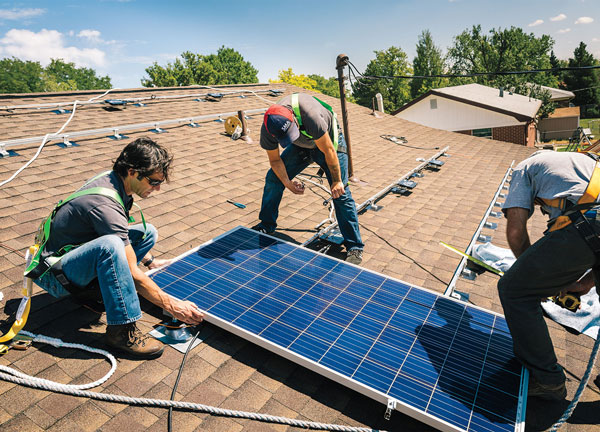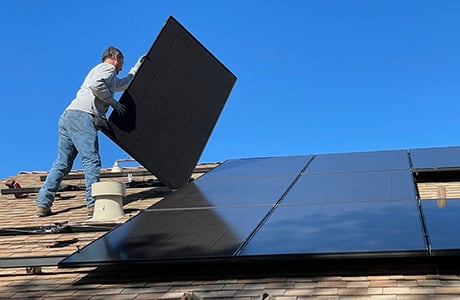The Best Solar Panels for Business: Reliable and Budget-Friendly Power Solutions
The Best Solar Panels for Business: Reliable and Budget-Friendly Power Solutions
Blog Article
How to Pick the Right Solar Energy Installation for Your Energy Requirements
Choosing an ideal solar power installment calls for a methodical technique that begins with a clear understanding of your power consumption patterns and expected future needs. Factors such as the kind of solar technology, setup expenses, and readily available incentives play crucial duties in making an informed decision - solar photovoltaic. Additionally, the choice of a qualified installer can not be ignored, as their competence can dramatically influence the performance and longevity of your system. As you consider these factors to consider, you might locate that the right course is not constantly the most evident one.
Assess Your Power Needs
Evaluating your power needs is a crucial initial step in the solar power setup process. Recognizing your current and future power intake will lead the layout of an efficient planetary system tailored to your needs. Start by examining your energy expenses from the previous year to determine your typical monthly power usage, generally gauged in kilowatt-hours (kWh) This data will certainly offer a foundation for computing the dimension of the planetary system you may need.
Think about seasonal variations in energy consumption, as certain months may require more power due to heating or air conditioning requirements. Furthermore, assess any kind of organized changes in lifestyle or residential property, such as the acquisition of electric cars or home expansions, which might boost your power needs in the future.
When you have a comprehensive understanding of your energy consumption, you can identify the suitable solar ability required to meet those needs. This evaluation not just assists in sizing the solar installment yet likewise informs choices about energy storage space solutions and possible grid link needs. solar photovoltaic. Inevitably, properly evaluating your energy needs makes certain that your solar energy system operates successfully, providing the benefits of sustainable power abreast with your consumption patterns

Evaluate Solar Innovation Options
When taking into consideration a solar energy installment, it is vital to examine the numerous solar technology options available to ensure the system straightens with your power demands and spending plan. The primary modern technologies consist of monocrystalline, polycrystalline, and thin-film photovoltaic panels, each offering unique advantages and disadvantages.
Monocrystalline panels are recognized for their high effectiveness and performance in minimal space, making them appropriate for domestic setups with less roof area. They tend to be a lot more pricey. Polycrystalline panels, while somewhat much less reliable, are typically more affordable and can be a good choice for bigger installations where area is not a restriction. Thin-film photovoltaic panels are light-weight and adaptable, ideal for non-traditional surface areas, however they typically have lower efficiency and call for more area to generate the very same power result.
In enhancement to panel kinds, think about solar inverters, which convert the straight present generated by the panels right into alternating present for home usage. String inverters, microinverters, and power optimizers each have distinct advantages that can influence system performance. Assessing these choices will certainly assist you make an educated choice that satisfies your energy requirements efficiently.
Consider Installment Prices
Comprehending installation expenses is essential for any person considering a solar energy system. These costs can differ dramatically based on a number of factors, including system dimension, kind of panels, and setup intricacy. A typical residential solar setup may range from $15,000 to $30,000 before rewards, which can be a considerable ahead of time financial investment.
To precisely examine setup prices, it is important to acquire comprehensive quotes from several solar suppliers. These quotes need to break down the costs of equipment, labor, permits, and any kind of additional accessories needed for the setup. Pay attention to the quality of products being supplied, as higher-quality panels and inverters can result in much better efficiency and long life, potentially countering higher preliminary costs.
Additionally, consider the long-lasting implications of setup prices. A less expensive installment could conserve money in advance yet might result in higher upkeep costs or lowered power production over time. It is also a good idea to evaluate financing alternatives, such as solar car loans or leases, which can impact your overall monetary commitment.
Research Local Incentives
Exploring neighborhood like this rewards can significantly influence the total price of a solar energy setup. Several regions supply a variety of economic motivations targeted at advertising renewable resource use, making solar power more easily accessible and affordable for home owners and organizations alike.
These incentives might include government tax credit scores, state discounts, and local energy business programs that provide money incentives or web metering choices. As an example, the Federal Investment Tax Obligation Credit Score (ITC) enables you to deduct a substantial portion of your solar installation expenses from your government taxes. State-specific motivations can additionally improve these financial savings, frequently in the kind of straight cash discounts or tax obligation credit histories.
In addition, some regional governments might supply building tax obligation exceptions this website for solar installments, making sure that your financial investment does not increase your property tax liability. Looking into these incentives can discover considerable savings, which can influence your choice on the size and type of solar system to install.

Pick a Trustworthy Installer
Picking a reliable installer is critical to ensuring the success and durability of your solar power system. The setup process substantially affects the efficiency and performance of your solar panels, making it imperative to choose a service provider with a proven track document.
Next, verify the installer's qualifications, including licenses, certifications, and insurance policy. A reputable installer must hold accreditations from recognized companies, such as the North American Board of Qualified Energy Experts (NABCEP), indicating a high degree of know-how. In addition, inquire regarding the installer's experience with similar projects, particularly in your area, as regional environment and policies can influence setup techniques.
Demand several quotes and contrast them not just on price but also on the quality of equipment and warranties provided. A trustworthy installer must provide clear information concerning their product or services, helping you make an educated choice. By investing time in selecting a reputable installer, you will certainly improve the general efficiency and sturdiness of your solar power system.
Verdict
To conclude, selecting the ideal solar energy More Help installation demands a detailed analysis of power requirements, an understanding of readily available solar modern technologies, and a mindful consideration of setup prices. Examining local incentives can improve monetary benefits, while choosing a trusted installer guarantees top quality workmanship and integrity. solar photovoltaic. By systematically analyzing these factors, people can accomplish an optimum solar service that meets both existing and future power needs, ultimately adding to sustainable energy methods and price savings over time
Report this page